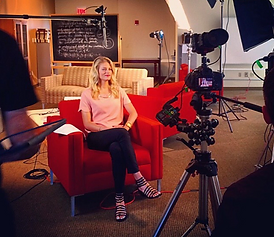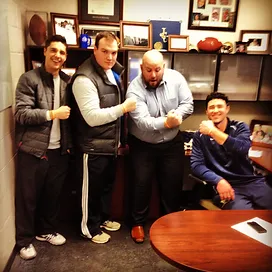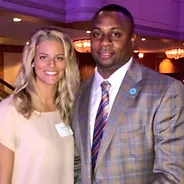About The Founder
About Gabriella Kreuz
About The Founder of Love Doesn’t Shove

Kreuz speaks in Scenario Learning’s national sexual violence education video
Gabriella Kreuz works as a freelance broadcast and commercial talent in the Cleveland area. She can be found dabbling in a number of gigs, from in-park hosting for the Cleveland Guardians to facilitating feature segments for Cleveland 19 News and chatting Cleveland sports on the BIGPLAY Podcast Network.
Kreuz incorporates her outgoing personality into Love Doesn’t Shove presentations to set a more upbeat tone to the traditionally “dark” dating violence conversation, all while being informative. Using her own experiences of violence as a spring board for an interactive dialogue, Kreuz aims to bring awareness, education and helpful resources to those in need. Locally, her efforts have been recognized by Crain’s Cleveland Business, Cleveland Magazine and local news outlets.
In Her Own Words
I started Love Doesn’t Shove as a teen dating violence awareness campaign my senior year at John Carroll University (2014) with intentions of starting an informative conversation on campus. Now, the organization has blossomed into an educational program featured in schools, businesses and sports teams across Northeast Ohio and beyond.
Campus Awareness

John Caroll University football coaches show off support with LDS wristbands (c) 2014
As a student-athlete and somebody who bounced around on campus to various activities, I felt as though my involvement could help circulate a positive message with the help of friends and teammates. It was something I wanted to do before I graduated because I felt that the topic was one that affected many students on campus, but was rarely talked about.
I had custom “Love Doesn’t Shove” wristbands created to sell around school to raise money for the Cleveland Domestic Violence and Child Advocacy Center (now called Journey Center for Safety and Healing). I wanted to donate to DVCAC because I had been in a support group through the organization and felt very grateful for the help I received.
Personal Experience
Two years earlier as sophomore at JCU, a routine physical argument with my high school sweetheart ended when a witness called campus police to intervene during one of his violent episodes. This was the beginning of the end of a relationship I hadn’t fully recognized/accepted as abusive. Though my boyfriend at the time was not a JCU student, an administrative restraining order was issued and he was banned from campus.
Help
The John Carroll Violence Prevention and Action Center briefed me on my legal options and resources for me at school. Though I did not press charges, I did accept help from DVCAC by joining one of their support groups suggested by an advocate. It turned out to be highly rewarding for me.
In group, I learned a lot about my experiences and was accompanied by many women who were in similar situations as me. It was the first time I realized that I was not “wrong” in my relationship or deserving of abuse. Failing to respond to a phone call immediately or refusing to “obey” rules such as not talking to certain members of my track team, for example, were not “offenses” deserving of violent reactions, no matter how much they were justified or minimized. Group helped me shed a lot of denial, learn about the dynamics of healthy relationships, and gain closure. It also simply helped me feel like I wasn’t alone. I knew one day I wanted to help others in my position to feel the same way– and more importantly, help education people before they find themselves too far in the cycle of violence.
Education and Understanding

Kreuz with LDS supporter and NFL Vice President Troy Vincent at DVCAC luncheon. (c) 2015
While finishing senior year at JCU, I decided to change my minor to sociology where I continued to learn about family violence, gender studies and sexuality. The classes, like group, helped me learn more about my own experiences and the experiences of my ex-boyfriend. I was able to piece together a better understanding of why he behaved in ways that he did and why I stayed.
Growing up in a blended family with addict siblings (who each had an addict parent who abandoned them), it had never even occurred to me that some of the toxic relationship dynamics I first learned with family members set the ground work for tolerating abuse in my dating relationship. Home environments are where we first learn, observe and experience what “normal” looks like. It is human nature to gravitate toward–and accept– what feels familiar, even if it is abusive. This is why intimate partner violence is so generational. Education is a proficient first step in helping end the cycle of violence by equipping Love Doesn’t Shove program listeners with awareness, effective communication skills and help resources.
Paying it Forward
Love Doesn’t Shove was created to help others through education. I strive to take what I have learned (and continue to learn), including all of the amazing help I’ve received, and gift it to others — especially young people who may find themselves in similar situations that I was once in.
Why Teens?
LDS is a universal message intended for all audiences. However, there is a program emphasis on reaching teens and young adults in particular to help them feel valued and give young, malleable minds an early framework for forming healthy habits before they have gone years thinking and behaving in potentially harmful ways. Addressing teen dating violence is important because it’s a way of treating all forms of intimate partner violence before it actually happens.
Giving a Voice
Although LDS was inspired by my personal experiences, the intention and the mission has always been to educate and provide a platform for others’ voices. i I may share parts of my personal story during presentations to help illustrate scenarios or relate to my audience, but the ultimate goal is to create a conversation and let young people make it their own.